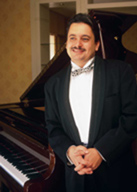|
Sonata in E Flat Major
The popular Levant folk song Dal’onah is a motif on which the first movement of a sonata was built. The sonata in E-flat major is called Jerusalem, The Sacred City, a three-movement composition by Jordanian pianist Khaled Asad who has recently made headlines in the small kingdom. Jordan’s share of producing celebrated musicians has at times fallen behind neighboring Arab nations but the cultural scene now fosters young talent enthusiastically. Although he has performed at Amman’s Royal Cultural Center as well as Cairo's Opera House, Asad makes a living as a civil engineer to supplement his earnings from music.
The sonata’s movements cleverly reflect a progression of political events that has influenced the composer’s Palestinian family. Politically charged art is often seem as a rite of passage for Arab composers who tend to produce at least one patriotic work. But for young Asad, it seems to be a natural reflection of genuine feelings. He starts with a cheerful and happy melody (leggierissimo) to represent the time period before the conflict and switches to sad and angry (andante mesto) mood to show rising tensions, for example. By the third movement, military marches conclude the all out war in the holy land. Some of the rhythmic and melodic motifs were inspired by Sergi Rachamaninoff’s prelude no. 5 op. 32. He is highly influenced by the Rachamaninoff as well as Franze Liszt and often performs their compositions. Asad started his musical training as a child at the International College in Beirut. He moved to Saudi Arabia during the civil war in Lebanon and studied the piano with a French instructor and spent summers in intensive training in France, until he went to Boston to study engineering. That presented an opportunity for him to study with musicians at the New England Conservatory. He started composing as a child and won several local competitions. Along the way, he performed in Geneva and Cannes before settling in Jordan to raise a family. The left-handed pianist developed a technique where the left hand provides additional orchestral accompaniment, as opposed to the usual base melody or tempo, thus producing a richer sound. He is still composing in the classical romantic form, with Middle Eastern background, and his other works include: Stars of Petra, Memories in Jordan, Remembering Rachmaninoff (combines an etude and piano concerto no. 2 improvised by Asad for solo Piano), Franz Lizst Variations (from Hungarian rhapsodies), Musical moments, Sara (composed for his daughter), and My Dream. Despite the time commitments for his job, family, and various performances, Asad, 36, still practices six hours daily, a sign of incredible seriousness. It is also a sign of even more impressive works yet to come. |
Tonight's piano concert to feature work inspired by September 11 By Hada Sarhan AMMAN Jordanian pianist and composer Khalid Asad will perform a piece he composed in the memory of the victims of Sept. 11 at his concert this evening at the Inter.Continental Hotel. My music is dedicated to all victims of horror, said the composer. He will open today's event with `Essence of New York,' in four movements: The first, called Prelude, is a flowing introduction to the second movement, called `The Attack and the Shock.' The humming replicates the sound of the plane's engines as it approaches the city of New York dramatically and violently. The two hits on the World Trade Centre are well expressed in this movement. The tone softens, and is replaced by the third movement, `Remembrance.' With a joyful melody permeated with sadness, `Remembrance' introduces the fourth movement, called `The March of Retaliation.' The final act is a strong, direct march, with the closing a tribute to the essence of New York. Asad's capacity to compose in classical-romantic form has led him to perform in theatres in Cairo, Geneva, and Cannes. As an Arab, I have a certain vision of how we can spread Arabic music across the world. We have to introduce our music, not just our singers, said the composer. He took the idea of his piece Rhapsody No. 1, `The Dance of the Arabian Horse,' from a makam (an Arabic tune). My inspiration came from the idea of Franz Liszt's great Hungarian Rhapsodies, which Liszt himself based on themes from Hungarian folklore, said Asad.' Inspiration for the first Rhapsody comes from the Arabian stallion, a source of pride for Arabs. Tonight's concert will also feature a piece entitled `Praising of the Stars.' The composer told The Jordan Times that the piece was inspired by the stars brilliantly piercing the great blanket of the sky during his earlier performances in Petra. Born in 1970, Asad started his musical training as a child at the International College in Beirut. He moved to Saudi Arabia during the civil war in Lebanon and studied piano with a French master instructor, while spending summers in intensive training in France. Asad studied in Boston's Northeastern University for his BA in civil engineering. He also studied with musicians at the New England Conservatory. |

